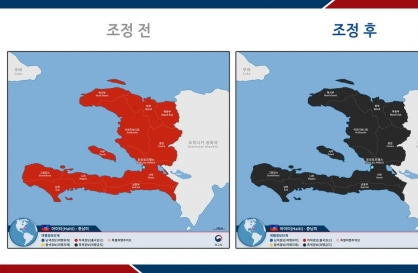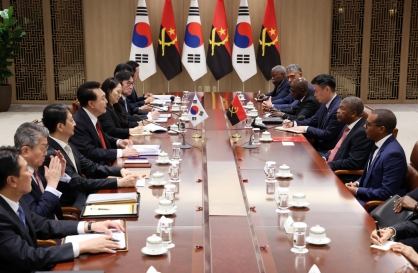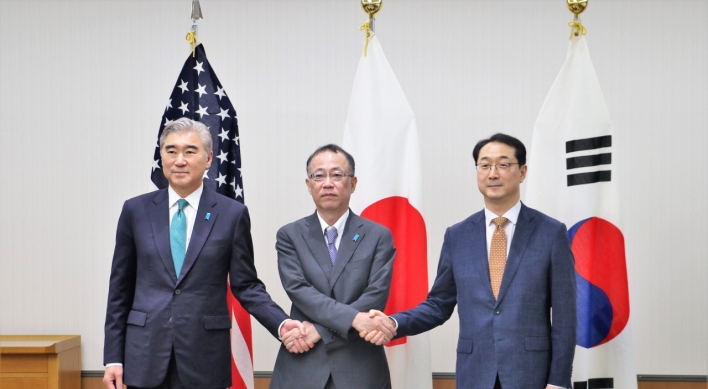S. Korea, China, Japan reaffirm commitment on N.K. nukes
By Korea HeraldPublished : Nov. 20, 2011 - 20:47

BALI, Indonesia (Yonhap News) ― The leaders of South Korea, China and Japan reaffirmed their commitment Saturday to working together to resolve the North Korean nuclear standoff and deepen all-round cooperation, the presidential office said.
South Korean President Lee Myung-bak, Chinese Premier Wen Jiabao and Japanese Prime Minister Yoshihiko Noda held a trilateral meeting on the sidelines of regional summits with Southeast Asian and other nations in the Indonesian resort island of Bali.
“The three leaders shared an understanding that they should cooperate closely at a time when uncertainties in the world economy are growing, so they can contribute to stability and development in Northeast Asia and reviving the world economy,” the presidential office said in a statement.
They also agreed to continue to cooperate to resolve the North Korean nuclear issue, it said.
The leaders praised September’s establishment in Seoul of a cooperation secretariat handling joint projects between the three countries, and agreed to cooperate to develop the office into a model of regional cooperation, the statement said.
“There has been brisk cooperation among the three countries in various areas this year and this is also a meaningful year as there was progress in institutionalizing (the cooperation),” Lee said in his opening remarks, referring to the secretariat’s establishment.
“The secretariat upgraded cooperation between the three countries to a new level,” he said. “Cooperation between the three countries will contribute to stability in Northeast Asia and global economic recovery amid increasing uncertainties in the global economy.”
South Korean Ambassador Shin Bong-kil, the first head of the secretariat, also attended the summit.
The Northeast Asian neighbors have annually held a three-way meeting on the sidelines of regional summits organized by the Association of Southeast Asian Nations. They hold another three-way summit in one of the three countries alternately, with Japan hosting this year’s meeting in May.
In the May summit, South Korea and China expressed strong solidarity for Japan, which was then suffering from the aftermath of March’s massive earthquake and tsunami as well as the world’s worst nuclear disaster since Chernobyl. Lee and Wen visited villages close to the nuclear accident site.
In his opening comments, Noda expressed “deep gratitude” for the support South Korea and China provided Japan in the wake of the disasters in March.
Noda said the situation at the Fukushima Daiichi nuclear power plant was heading toward stabilization and promised to continue to provide South Korea and China with related information in a swift manner.
Lee was to spend the rest of Saturday at meetings of the East Asia Summit forum, an 18-nation group that includes the U.S. and Russia. U.S. President Barack Obama has been in Bali for the meetings.
Obama’s attendance has been a focus of South Korean media attention due to the possibility of him meeting with Lee to talk about the free trade agreement between the two countries, though officials said such a meeting is unlikely.
The trade pact, which was approved by the U.S. Congress last month, has been deadlocked in the South Korean parliament as the main opposition Democratic Party has demanded the scrapping of a dispute-settlement clause in the deal that it claims unfairly favors the U.S.
The EAS forum also brings together all five countries that have been negotiating with North Korea for years to end the communist nation’s nuclear programs under the six-party talks. The talks involve the two Koreas, China, Japan, Russia and the U.S.
South Korean President Lee Myung-bak, Chinese Premier Wen Jiabao and Japanese Prime Minister Yoshihiko Noda held a trilateral meeting on the sidelines of regional summits with Southeast Asian and other nations in the Indonesian resort island of Bali.
“The three leaders shared an understanding that they should cooperate closely at a time when uncertainties in the world economy are growing, so they can contribute to stability and development in Northeast Asia and reviving the world economy,” the presidential office said in a statement.
They also agreed to continue to cooperate to resolve the North Korean nuclear issue, it said.
The leaders praised September’s establishment in Seoul of a cooperation secretariat handling joint projects between the three countries, and agreed to cooperate to develop the office into a model of regional cooperation, the statement said.
“There has been brisk cooperation among the three countries in various areas this year and this is also a meaningful year as there was progress in institutionalizing (the cooperation),” Lee said in his opening remarks, referring to the secretariat’s establishment.
“The secretariat upgraded cooperation between the three countries to a new level,” he said. “Cooperation between the three countries will contribute to stability in Northeast Asia and global economic recovery amid increasing uncertainties in the global economy.”
South Korean Ambassador Shin Bong-kil, the first head of the secretariat, also attended the summit.
The Northeast Asian neighbors have annually held a three-way meeting on the sidelines of regional summits organized by the Association of Southeast Asian Nations. They hold another three-way summit in one of the three countries alternately, with Japan hosting this year’s meeting in May.
In the May summit, South Korea and China expressed strong solidarity for Japan, which was then suffering from the aftermath of March’s massive earthquake and tsunami as well as the world’s worst nuclear disaster since Chernobyl. Lee and Wen visited villages close to the nuclear accident site.
In his opening comments, Noda expressed “deep gratitude” for the support South Korea and China provided Japan in the wake of the disasters in March.
Noda said the situation at the Fukushima Daiichi nuclear power plant was heading toward stabilization and promised to continue to provide South Korea and China with related information in a swift manner.
Lee was to spend the rest of Saturday at meetings of the East Asia Summit forum, an 18-nation group that includes the U.S. and Russia. U.S. President Barack Obama has been in Bali for the meetings.
Obama’s attendance has been a focus of South Korean media attention due to the possibility of him meeting with Lee to talk about the free trade agreement between the two countries, though officials said such a meeting is unlikely.
The trade pact, which was approved by the U.S. Congress last month, has been deadlocked in the South Korean parliament as the main opposition Democratic Party has demanded the scrapping of a dispute-settlement clause in the deal that it claims unfairly favors the U.S.
The EAS forum also brings together all five countries that have been negotiating with North Korea for years to end the communist nation’s nuclear programs under the six-party talks. The talks involve the two Koreas, China, Japan, Russia and the U.S.
-
Articles by Korea Herald



















